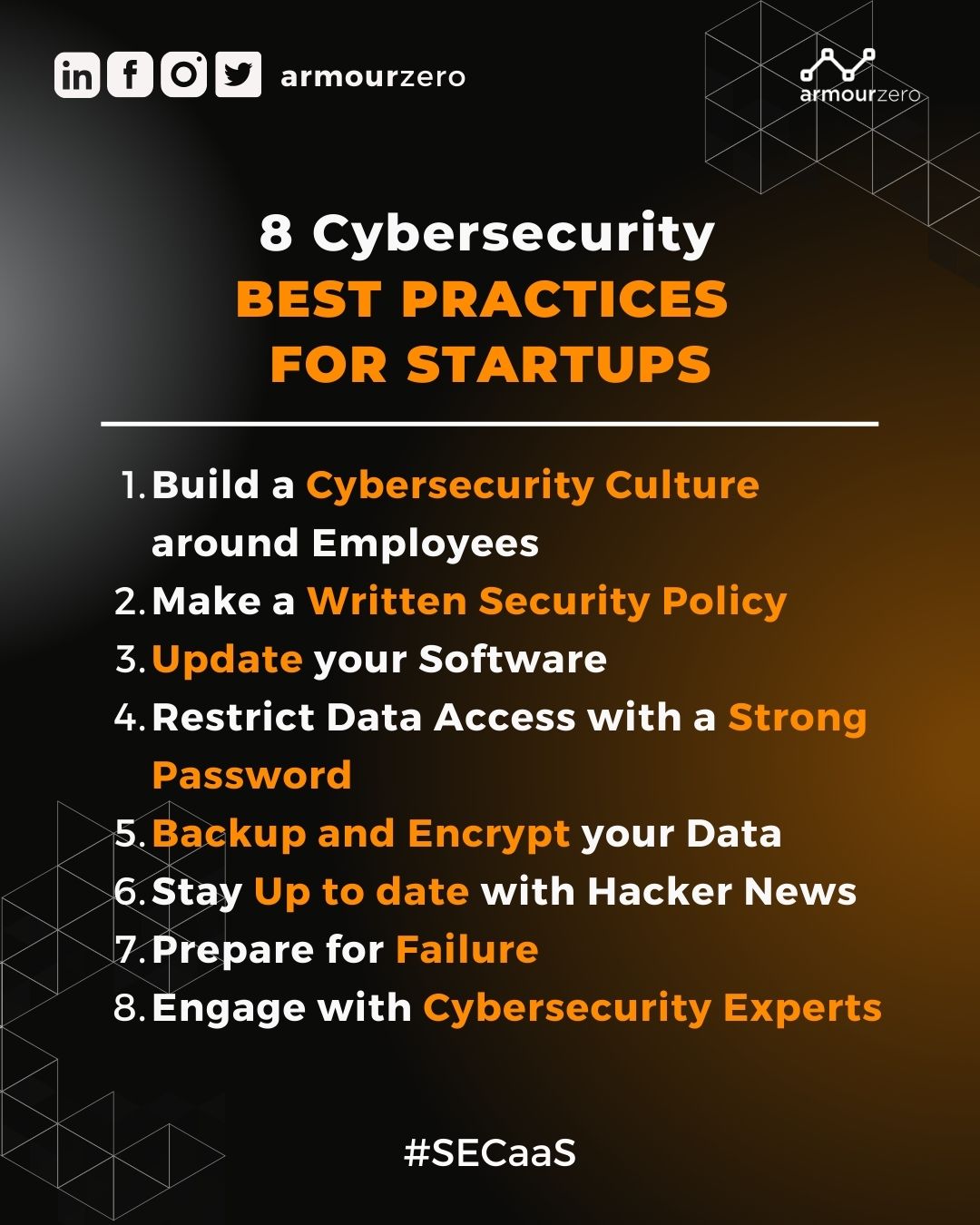8 Cybersecurity Best Practices
for Startups

Website hacking is becoming increasingly common, no matter the size, scope or kind of organisation. In 2020, more than one million WordPress sites were hacked. On average, 30,000 websites are hacked each day, most owned by legitimate small businesses.
Despite these worrying facts about hacking websites, many companies still believe that hackers have no reason to attack websites because they are not hacked. Attackers are constantly crawling and snooping on websites to identify vulnerabilities to break into them and bid.
Cybercriminals target startups to reach 50 per cent, because security measures may not be fully implemented. In SMEs, customer trust is critical in a time of widespread cybercrime and data privacy attacks. Startup owners now face the challenge of building consumer trust as they build their businesses.
Financial motivations trigger many websites hacks about hackers using sophisticated tools to break into cybersecurity, data files, and corporate servers. Negligent employees, contractors, and third parties cause the majority of data breaches. And startup owners should beware of this.
Through this article, we want to help you understand all startup cyber safety best practices.
What happens if startups get attacked?
The consequences of hacking are complex, time-consuming, and expensive, and can eventually shut down businesses. Hackers can steal business’ confidential information, from its financial report, business plans, intellectual property, employees’ and customers’ information, and many more.
In other words, hackers can take anything they want that may destroy your business’ reputation.
You may also read about Cyber Threats Types
Cyber Safety Best Practices

1. Build a Cybersecurity Culture around Employees
Team training is not just about improving their cybersecurity knowledge. But to build a culture of safety protocols in your team. In terms of security practices, everyone should be on one page to avoid all vulnerabilities.
Some data breaches recorded over the years started with an employee accidentally opening a phishing email, or someone on the team accidentally leaking sensitive information. These should all be avoided.
2. Make a Written Security Policy
Startups need a written security policy that is easily accessible to all employees and covers all possible hacking scenarios and how to respond to them. So that in the event of a hack, employees can use the security policy as a checklist to ensure compliance with standards.
3. Update your Software
Threat actors are constantly looking for ways to exploit software vulnerabilities. Threats use ransomware and software to start installing hacking systems.
But you don’t have to worry, because software companies usually provide regular updates to deal with these types of problems when they are found and to make other fixes. So as a startup owner, you have to pay attention if your cybersecurity software makes the latest updates.
4. Restrict Data Access with a Strong Password
Startups, whose core team has no cybersecurity experience, will be vulnerable to data clutter.
To avoid this, it’s a good idea for each team member to protect their data with a unique, complex, and hard-to-decrypt password.
Also, ensure that your employees do not have access to download or install their own software programs. Restricting network access further increases the security of your network.
Do the same for customers, if they subscribe to or log into your site, ask them to use a complex password and two-step verification for their own protection.
Read more about Armour Your Password
5. Backup and Encrypt your Data
Always backup and encrypt all your data and keep it in a safe place. This technique helps stop the ransomware before it causes significant damage. If hackers save data for ransom, you have the option to wipe the device and start over with a new device. You can recover data from there.
Encrypting data can also prevent hackers from decrypting stolen data.
You may also read about The Importance of Data Backups
6. Stay Up to date with Hacker News
Today, there are many variants of ransomware and malware. And this variant will probably continue to grow even more dangerous than the previous one. You can wait until your startup is hacked, to learn about the risks involved. But you have to be able to prevent it.
Try to follow blogs or news about cybersecurity for all new and existing threats.
7. Prepare for Failure
When it comes to cybercrime and malware, there is absolutely no certainty. Even the safest companies can be hacked, but they can get out of hacking without damaging their reputation or customers because they have a plan of action.
Startups need to be prepared for all eventualities, look for good security systems, keep up with hacking trends, and constantly test and investigate security policies and best practices to keep them as secure as possible.
8. Engage with Cybersecurity Experts
The success of a tech startup depends heavily on speed and agility and investing time and resources in cybersecurity. Startup owners should work with a good security service provider, so they can focus on growing their business.
There are many SOC service providers to assist business owners in overseeing cybersecurity in their companies. But with today’s technological developments, ArmourZero is here to help startup owners provide subscription-based cybersecurity.
Startup owners don’t have to buy software licences and pay people to supervise, because ArmourZero does it all.
Still confused about how to choose cybersecurity solutions for your startups? You can consider ArmourZero, a cybersecurity service subscription fit for your company no matter who and where you are. Also, ArmourZero provides a 1-year free Endpoint Protection with EDR as-a-Service for this service that you can get here.
*This article has been published on e27.co on 10 May, 2022
![]()
Written by:
Bernadetta Septarini (Content Marketing). Experienced content marketing and social media in the information technology and services industry.
Share this post
Related Posts

What is DevSecOps? Definition & Best Practices for Tech Industries
- 18 Apr 2024
- By:Bernadetta Septarini
- Category: ArmourHacks
Learn about DevSecOps, principles, and best practices for the tech industry. Integrate security seamlessly into software development and enhance quality.

Safeguarding Your Organisation During the Hari Raya Holiday
- 09 Apr 2024
- By:Bernadetta Septarini
- Category: ArmourHacks
Protect your organisation from holiday cyberattacks during Hari Raya. Learn more about the risks and best practices for holiday security with ArmourZero.

Cyberattacks: A Growing Threat to Higher Education
- 02 Apr 2024
- By:Fanny Fajarianti
- Category: ArmourHacks
Universities hold sensitive data but face cyberattack risks in the digital age. Explore the impact of cyberattack and learn how to protect your institution.

Innovative Strategies for Cybersecurity in the AI Era
- 27 Mar 2024
- By:Bernadetta Septarini
- Category: ArmourHacks
Discover how AI is reshaping cybersecurity and safeguard your organisation in our latest blog post. Learn how to protect your business in today’s digital world.

